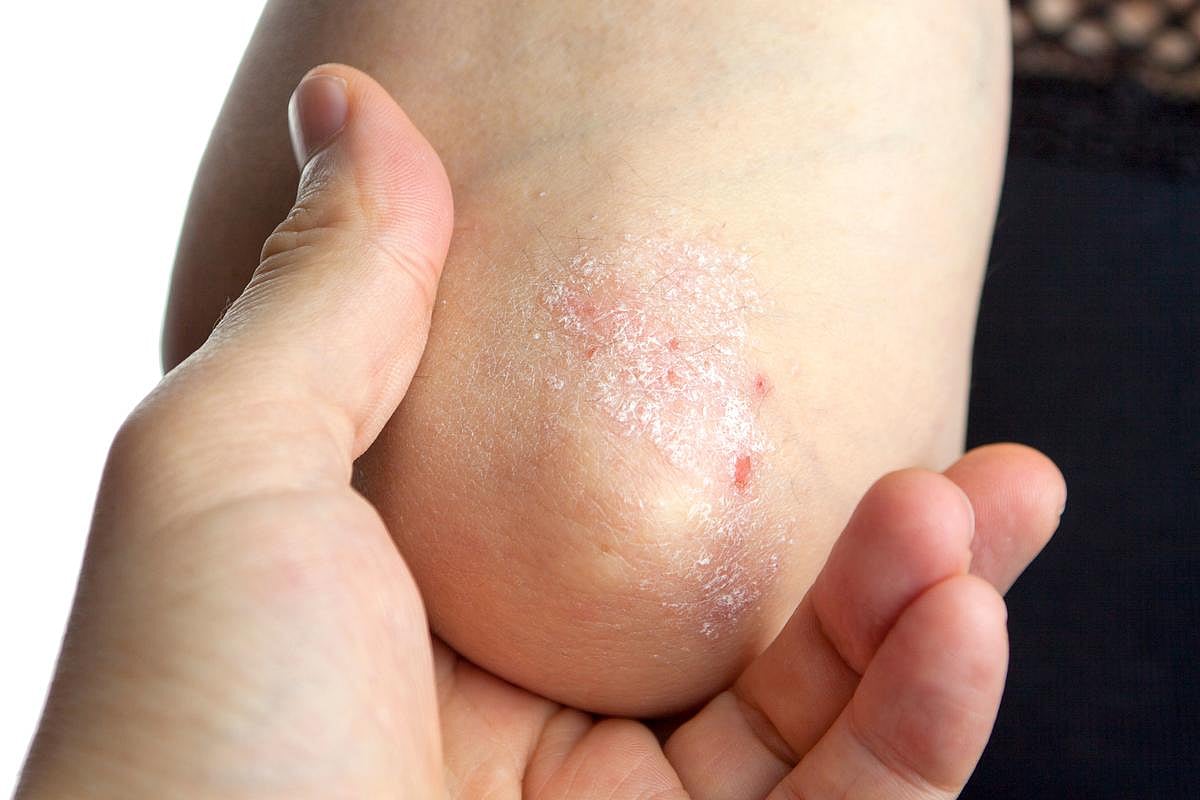Recursos del Paciente
Manténgase sano!
Psoriasis 101: Causes, Symptoms and Treatments, Explained
- July 7, 2025
- Dr. Duaa AbdelHameid
- HealthDay Reporter

Psoriasis is a chronic autoimmune condition that mainly affects the skin. When you have psoriasis, your immune system sends signals to your skin cells to grow too fast.
Normally, skin cells take about a month to form and rise to the surface. In people with psoriasis, this process happens in just a few days. Because the skin can’t shed these cells fast enough, they pile up and form thick, scaly patches called plaques.
These plaques can appear anywhere, but they are most common on the elbows, knees, scalp and lower back. Psoriasis is not contagious, meaning you cannot catch it from someone else or give it to anyone.
What causes psoriasis?
Psoriasis develops when the immune system becomes overactive, but the exact reason why this happens isn’t fully understood. It seems to be a combination of genetics and triggers in the environment.
Genetics: If someone in your family has psoriasis, your chances of getting it are higher.
Immune system: Psoriasis is considered an autoimmune disease, in which your body attacks healthy skin cells by mistake.
Triggers: Even if you’re genetically prone to psoriasis, it may only show up after something sets it off. Triggers vary from person to person, but common ones include: stress, infections (like strep throat), skin injuries (cuts, burns, bug bites), certain medications, cold or dry weather and smoking and heavy alcohol use
Types of psoriasis
There are several types of psoriasis. Most people have plaque psoriasis, but others may have different forms:
Plaque Psoriasis: The most common type, it appears as raised, red patches covered with silvery-white scales.
Guttate Psoriasis: Often triggered by infections, especially in children and young adults, it looks like small, drop-shaped spots.
Inverse Psoriasis: This type affects skin folds like the armpits, under the breasts, or around the groin. The patches are shiny and red but not scaly.
Pustular Psoriasis: Characterized by white pus-filled bumps surrounded by red skin, this type can be painful and is more serious.
Erythrodermic Psoriasis: This is a rare but severe type that causes widespread redness and skin shedding. It can be life-threatening and needs immediate medical attention.
Symptoms of psoriasis
Psoriasis symptoms can vary widely depending on the type and severity, but some common signs include:
Red, inflamed patches of skin
Thick, silvery-white scales
Dry, cracked skin that may bleed
Itching, burning or soreness
Thickened or pitted nails
Joint pain (in a condition called psoriatic arthritis, which affects up to 30% of people with psoriasis)
Symptoms may come and go. You might have flare-ups followed by periods when the condition improves or even goes away for a while.
Is there a cure?
There is no cure for psoriasis, but there are many effective treatments to help manage the symptoms and improve your quality of life. What works for one person may not work for another, so treatment often involves some trial and error.
Treatment options
Topical Treatments: These are creams and ointments applied directly to the skin. They are often the first step in treating mild-to-moderate psoriasis. Examples include:
Corticosteroids
Vitamin D analogs (like calcipotriene)
Coal tar
Salicylic acid
Phototherapy (Light Therapy): This involves exposing the skin to natural or artificial ultraviolet (UV) light under the supervision of a doctor. UVB light, a specific band of UV light used in dermatology to treat various inflammatory conditions, can slow skin cell growth and reduce inflammation.
Systemic Medications: For moderate to severe psoriasis, oral or injected medications may be used. These work throughout the body and include:
Biologic drugs (such as adalimumab, etanercept or secukinumab)
Biologics are more targeted and often used when other treatments don’t help or cause side effects.
Lifestyle and home care
In addition to medical treatment, making lifestyle changes can help reduce flares and keep your skin healthier:
Moisturize daily to prevent dryness and cracking.
Manage stress through relaxation techniques, as stress can trigger flare-ups.
Avoid skin injuries, which can lead to new patches (known as the “Koebner phenomenon”).
Quit smoking and limit alcohol, both of which can worsen psoriasis.
Eat a balanced diet with anti-inflammatory foods such as fruits, vegetables and omega-3 fatty acids.
Bathe smart by using gentle soaps and lukewarm water, and apply moisturizer afterward.
When to see a doctor
You should see a healthcare provider if:
You notice red, scaly patches that don’t go away.
Your symptoms worsen or spread quickly.
Your joints hurt or feel stiff.
A dermatologist can diagnose psoriasis and help develop a treatment plan tailored to your needs.
Psoriasis is a lifelong condition, but with the right care, most people can manage their symptoms and live comfortably.
Understanding your type of psoriasis, identifying triggers and following your treatment plan can make a big difference. If you have concerns or new symptoms, don’t hesitate to reach out to a medical professional.
About the expert
Dr. Duaa AbdelHameid is a VCU Health dermatologist and assistant professor of dermatology at Virginia Commonwealth University. VCU Health is a university based hospital system serving Virginia and the mid-Atlantic region. It has an unwavering commitment to providing exceptional, quality care every day.

